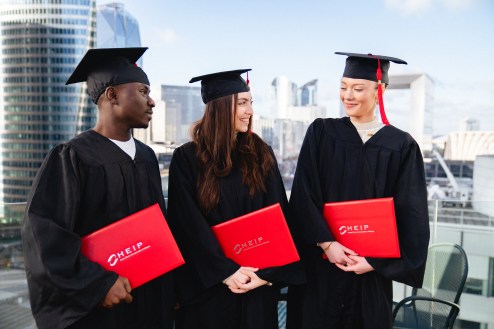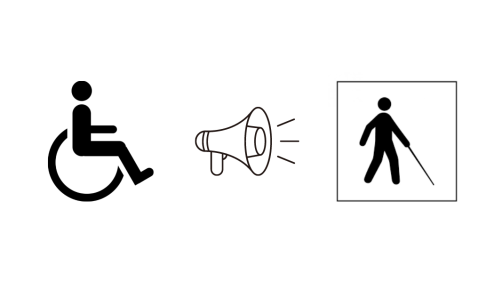Presentation
In three years of study, the Bachelor’s in International Relations & Political Science will provide you with a solid foundation of essential knowledge in international relations, political science, law, economics, geopolitics, and geo-economics.
The main objectives of this program are to help you:
- Acquire the methodological foundations, core knowledge, and research and analytical methods specific to each of the major disciplines.
- Assimilate and deepen your understanding of the concepts and theories of International Relations and Political Science.
- Discover and understand the various components of the legal, economic, and geopolitical environment.
To achieve these goals, this program includes several advantages:
An Innovating
Teaching Model
Core Knowledge
Active and immersive pedagogy
Applied knowledge
Practical application
A variety of
Teaching Methods
Lectures
Small group seminars
Group work
E-learning
Workshops
A Genuine Support
Throughout the Year
Professional world preparation
Individual or group project work
Organization of a series of conferences
An International
Exposure
Study three foreign languages during the program (english is mandatory)
In the third year, there is a possibility to study for one semester at one of our campuses (London or Geneva) or at one of our partner schools around the world
For a deeper immersion, choose our 100% English-taught program
Multiple Evaluation
Methods
Throughout the year, students are assessed through continuous evaluation.
At the end of each semester, additional methods are used for student assessment, including exams and practical case studies.
A Professional-Oriented
Programme
An internship period is offered each year, starting from the first year.
The internship becomes mandatory in the third year.
To learn more about our Programme, feel free to download our documentation.
Program
The first and second years consist of two semesters of study, to be completed at one of the HEIP campuses in France. In addition to this period of learning, each year includes an optional internship period.
The third year offers the possibility of a semester of study abroad. An internship is compulsory for students in France in the second semester.
Main Course Themes
- Geostrategy
- Constitutional Law and Political Institutions
- Public International Law
- Methodology and Analysis of International Relations
- Analysis of International News and Geopolitics
- Introduction to Financial and Monetary Issues
- State, Finance, and Public Policies
- Comparative Political Regimes
- Geopolitics of Religions
- Major Contemporary Conflicts
- Theory of International Relations
- Artificial Intelligence and Societal Changes
- Geopolitics of International Crime
- Introduction to Public Finances and Taxation
- Economics and Climate Issues
In the Third Year: a Common Core + a Major to Choose
- Political Science
- Contemporary Political Issues
- Public Speaking and Work in a Political Office
- Introduction to Local Government Law
- Public Opinion and Media
- Elections and Electoral Law
- History of Political Parties and Political Commitment
- International Relations
- History of International Law
- International Affairs and Modern Diplomacy
- International Economic Relations and Institutions
- Geopolitics – Area studies (Asia-Pacific, Sub-Saharan Africa, Middle East, etc)
The list below gives an overview of the courses. For a more complete list, feel free to download the documentation.
Pursuing your studies
Once you have completed the programme, you will have the opportunity, if you want, to continue your studies in a graduate programme.
HEIP offers postgraduate specialisation programmes. Find out more about our programmes below:
MSc Expert in International Relations & Cooperation
master the traditional approach of studying International Relations and the mechanisms of Contemporary Diplomacy. Courses explore in-depth political, legal and economic aspects of the foreign relations of states, including the European Union.
MSc Public Affairs & Institutional Management
Train high-performance managers capable of successfully handling the transformation of administrations, their international expansion, the issue of territories, and all the problems that arise in the management of the state at a time of reducing expenses and the digital transformation of the traditional tools of public management.
Admissions

Prerequisites for the First Year (B1)
- Holder of the A Level (or in the process of obtaining it)
- A strong interest in and knowledge of Political Science and International Relations, History, Geography, Geopolitics, Foreign Languages, Economics and Law.
- An ability to analyse the themes studied.
You may also apply for the second or third year of the Bachelor program.
Prerequisites for the Second/Third Year (B2/B3)
- Holder of a undergraduate degree (60 ECTS credits for B2, 120 ECTS credits for B3), obtained (or in the process of obtaining) from a higher education institution in France or abroad
- A strong interest in and knowledge of Political Science and International Relations, History, Geography, Geopolitics, Foreign Languages, Economics and Law.
- An ability to analyse the themes studied.
Admission Process
- Submit an application file
- Written admission tests
- Oral admission test
The candidate will receive the results of the tests 4 weeks after presenting their application file to the jury. All details are provided on the Bachelor Admission page.
Fees
Tuition Fees:
€8,950 per year of studies (with a €1,100 reservation deposit)
103 € CVEC tax to be paid before the start of the school year following registration
Application Fees:
€70 (for any year of studies you are applying to)
These fees are valid for the 2025/2026 academic year and are subject to annual review.
Practical Information
Recognition of the Program
- This program awards a “Bachelor’s in International Relations and Political Science” Certificate from HEIP.
- Each completed academic year also provides with 60 ECTS credits (European Credit Transfer System). This system facilitates a simpler and more transparent recognition of diplomas and qualifications between European Union countries, making each student’s academic journey more flexible and transparent. For more information about the ECTS system, feel free to consult the official page.

Satisfaction Survey
- Teacher quality (pedagogy, expertise, availability, support, dialogue): 84%.
- Quality of training programs, content and courses offered: 76%.
- Teaching methods used: 82%.
- Access to information (extranet, e-mail newsletters, online campus, social networks, internship platform): 75%.
- Quality of the working environment: 84%.
*Opinion Way april 2024

Speakers
All our speakers are lecturers or experts in their field.

Campuses
Courses are held in Paris, Lyon, Bordeaux, Rennes or Toulouse.
Consult the informations on each of them on our dedicated page.

Accessibility
The HEIP admission process is accessible to people with physical disabilities since the competition is 100% online.
For people with invisible or mental disabilities, the admission teams may adapt the tests.
All HEIP campuses (Paris, Lyon, Bordeaux and London) are accessible to people with reduced mobility.





